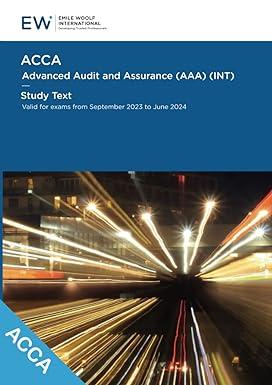Question
1) Your annual audit of OPQ, Inc. had the following issues: Even though OPQ had significant long-term debt, all of which were bank loans secured
1) Your annual audit of OPQ, Inc. had the following issues:
Even though OPQ had significant long-term debt, all of which were bank loans secured by various fixed assets and some of which included restrictive covenants, you decided not to confirm the debt with the banks that issued the debt. You had audited the firm for years and their balance sheet listed the same loans as last year, just reduced by the amount of the principle they paid during the year. However, management didn't tell you that the firm had incurred a major new loan to compensate for a significant drop in its operating cash flows. Thus, you ended providing a clean opinion on a set of financial statements that materially understated long-term debt.
You were aware that all of the banks that had issued loans to OPQ in the past required audited financial statements as part of their loan approval process.
Shortly after you had issued your report, OPQ's cash flow problems continued to deteriorate. The tried to compensate in two ways. First, they took out another large bank loan from one of the banks that held other bank notes from the firm, using your audited financial statements as support for the loan. Second, they sold additional stock to raise additional capital. The used your audit financial statements in the prospectus they issued to support the new stock sale. OPQ's stock is publicly traded and subject to SEC regulation.
Approximately six months after OPQ executed both the new loan and the stock sale, they declared bankruptcy because their operating cash continued to deteriorate to the point they could no longer make the debt payments. Because of the bankruptcy, trading was suspended on OPQ's stock because its value had dropped by 98% and the banks could only recover 20% of the remaining balances on their loans.
Both the bank that had issued the new loan and several major stockholders that had purchased stock from the new offering sued you to recover their losses. Answer the following questions and justify your answers with specific references to the appropriate laws and legal principles. Be thorough in covering all the issues concerning both if they bank will prevail.
a) Will the bank be successful in their law suit against you for:
i) ordinary negligence?
ii) fraud?
b) Will the stockholders who purchased their stock in the stock offering for which OPQ used your audit financial statements succeed in against you under each of the following bodies of law?
i) Common Law
ii) Federal securities law (be sure to indicate which statue)
Step by Step Solution
There are 3 Steps involved in it
Step: 1

Get Instant Access to Expert-Tailored Solutions
See step-by-step solutions with expert insights and AI powered tools for academic success
Step: 2

Step: 3

Ace Your Homework with AI
Get the answers you need in no time with our AI-driven, step-by-step assistance
Get Started


